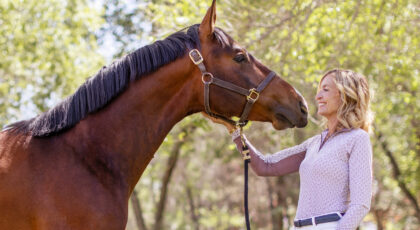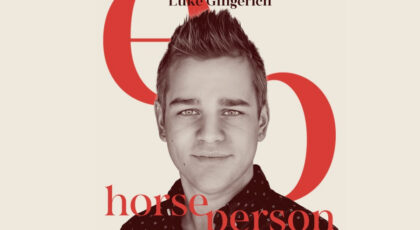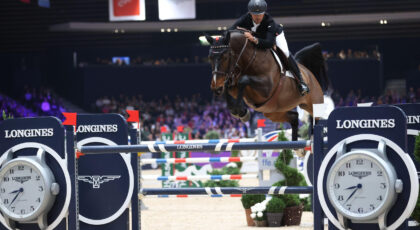One of the most impressive qualities of some of today’s top Natural Horsemanship clinicians is their honesty to admit they don’t have all the answers.
They remind us to keep an opened mind and that horsemanship is a lifelong journey where we never stop learning. Their desire to keep searching for the best way to find true unity between horse and human is what makes them great teachers.
Originally some of these master horsemen were taught the more traditional (non-natural) methods of horse training and horsemanship. Remarkably, it was after they changed their traditional methods and became successful in Natural Horsemanship practice and reputation that they publicly admitted that someone else’s different training method might be better. Not only did this take an opened mind, it showed great humility and courage with their egos.
I didn’t grow up with horses and didn’t get involved with them until I was in my late forties. The bad news is I missed out on being young, fearless and riding by the seat of my pants. The good news is when I finally fell in love with horses and wanted to learn everything I could, Natural Horsemanship was being taught by these master horsemen.
Being an “old” beginner turned out to be a blessing.
I knew I knew nothing. I could ask endless questions, make mistakes, fall off my horse and not once have to experience the excruciating pain of hearing my ego scream “You don’t look good!” and “What are other people thinking about you?!”
As the years went on however, and I learned more, I became aware of a little voice in my head. It said: “Now that you’re a horseman and a teacher it’s important that you look like you have the answers, so don’t ask questions.”
Today when I work with people and see them struggling with their egos, trying to keep an open mind and try something different, I also see myself. What’s difficult for the student can also be difficult for the teacher. Unlike horses; humans have egos.
Sometimes it’s difficult but I know I will always learn more if I try to stay in what the Buddhist’s call “beginner’s mind.” I remind myself; when I was a beginner I never learned as quickly or as much. I was also never happier.
The more I learn about the relationship between humans and horses the more I see that all of us who love and ride horses have the same goal. It doesn’t matter if we ride English or Western, studied at the Spanish Riding School or learned to ride on a Montana cattle ranch—the goal is to be one with our horse. To have a true happy and willing partner. To ride in harmony and have it be as fun for our horse as it is for us.
Years ago when I was privileged to study with the late Tom Dorrance. Tom had grown up on a northern California horse and cattle ranch. He had become so well known as a horseman who could see everything from the horse’s point of view he was referred to as “The Horses’ Lawyer.”
I had a million questions I wanted to ask Tom. I wanted to know everything he knew but I knew that wasn’t possible, so I asked him what books he would suggest I read when I got home. Naturally I expected him to refer me to some classic cowboy manual. Instead he simply said, “Read Dressage by Henry Wynmalen and Kinship With All Life by J. Allen Boone.”
I had no idea what to expect from the latter book, but I had heard of dressage and that was the last thing I thought a California cowboy would know about, much less be recommending.
I bought both books, read them and over the years many others like them. Now I know why one of the greatest horsemen of our time suggested them.
Dressage teaches us what we all need to do with our horses, no matter what discipline—English or Western—we chose to ride: We must communicate to our horse with lightness from his mind to his body to his legs to his feet. We must communicate with our horse mentally and emotionally—not just physically.
Kinship With All Life is little tiny book. Some read it and find it too “far out” or childlike. Others find it charming. Nevertheless, its message is clear. Horses, like all animals including the human, are creatures that possess a spiritual nature. For me, this means that on some level we are all connected and equal. We all deserve to be treated with compassion and respect.
Learning something for the first time can be fun and exciting. Learning a new or different way can also be exciting. It can also be very threatening to our ego. Natural horsemanship teaches me to be flexible. Nothing is set in stone.
If I want to learn more and keep getting better, I need to keep an opened mind. The day I stop learning, I stop growing. If I want my horse to be teachable, I have to be teachable. That’s natural.
Leo Tolstoy wrote: “I know that most men, including those at ease with problems of the greatest complexity, can seldom accept even the simplest and most obvious truth if it be such as would oblige them to admit the falsity of conclusions which they have delighted in explaining to colleagues, which they have proudly taught to others, and which they have woven, thread by thread, into the fabric of their lives.”
About the Author
Tim Hayes is the author of RIDING HOME – The Power of Horses to Heal. It is this amazing power of horses to heal and teach us about ourselves that is accessible to everyone and found in the pages this book. To learn more about the book, visit: www.ridinghome.com. Every book ordered will benefit children of families in need, veterans with PTSD and children with autism. To contact Tim go to: www.hayesisforhorses.com.




 April 18, 2019
April 18, 2019 



























